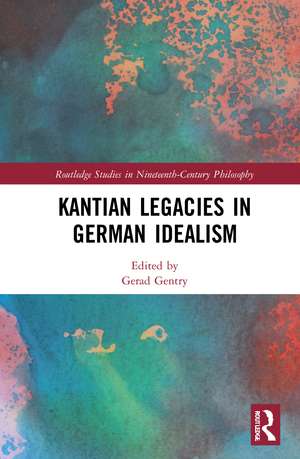Kantian Legacies in German Idealism: Routledge Studies in Nineteenth-Century Philosophy
Editat de Gerad Gentryen Limba Engleză Paperback – 25 sep 2023
| Toate formatele și edițiile | Preț | Express |
|---|---|---|
| Paperback (1) | 387.58 lei 6-8 săpt. | |
| Taylor & Francis – 25 sep 2023 | 387.58 lei 6-8 săpt. | |
| Hardback (1) | 1005.97 lei 3-5 săpt. | +29.52 lei 5-11 zile |
| Taylor & Francis – 11 mai 2021 | 1005.97 lei 3-5 săpt. | +29.52 lei 5-11 zile |
Din seria Routledge Studies in Nineteenth-Century Philosophy
- 8%
 Preț: 382.69 lei
Preț: 382.69 lei -
 Preț: 311.41 lei
Preț: 311.41 lei -
 Preț: 310.70 lei
Preț: 310.70 lei -
 Preț: 324.64 lei
Preț: 324.64 lei -
 Preț: 312.42 lei
Preț: 312.42 lei - 17%
 Preț: 271.43 lei
Preț: 271.43 lei - 13%
 Preț: 322.88 lei
Preț: 322.88 lei - 18%
 Preț: 1009.13 lei
Preț: 1009.13 lei -
 Preț: 389.70 lei
Preț: 389.70 lei - 18%
 Preț: 898.49 lei
Preț: 898.49 lei - 18%
 Preț: 1113.63 lei
Preț: 1113.63 lei - 18%
 Preț: 997.42 lei
Preț: 997.42 lei - 16%
 Preț: 310.89 lei
Preț: 310.89 lei -
 Preț: 485.40 lei
Preț: 485.40 lei -
 Preț: 415.24 lei
Preț: 415.24 lei - 18%
 Preț: 1003.93 lei
Preț: 1003.93 lei - 18%
 Preț: 1003.93 lei
Preț: 1003.93 lei -
 Preț: 431.95 lei
Preț: 431.95 lei -
 Preț: 386.81 lei
Preț: 386.81 lei -
 Preț: 383.93 lei
Preț: 383.93 lei -
 Preț: 436.14 lei
Preț: 436.14 lei -
 Preț: 387.96 lei
Preț: 387.96 lei -
 Preț: 490.25 lei
Preț: 490.25 lei - 18%
 Preț: 906.65 lei
Preț: 906.65 lei - 18%
 Preț: 1002.80 lei
Preț: 1002.80 lei - 18%
 Preț: 891.53 lei
Preț: 891.53 lei - 18%
 Preț: 1009.11 lei
Preț: 1009.11 lei - 28%
 Preț: 821.06 lei
Preț: 821.06 lei - 18%
 Preț: 1003.58 lei
Preț: 1003.58 lei - 18%
 Preț: 841.63 lei
Preț: 841.63 lei -
 Preț: 385.25 lei
Preț: 385.25 lei - 18%
 Preț: 998.71 lei
Preț: 998.71 lei - 18%
 Preț: 999.51 lei
Preț: 999.51 lei - 18%
 Preț: 1060.19 lei
Preț: 1060.19 lei
Preț: 387.58 lei
Nou
Puncte Express: 581
Preț estimativ în valută:
74.17€ • 77.15$ • 61.23£
74.17€ • 77.15$ • 61.23£
Carte tipărită la comandă
Livrare economică 14-28 aprilie
Preluare comenzi: 021 569.72.76
Specificații
ISBN-13: 9781032001609
ISBN-10: 1032001607
Pagini: 298
Ilustrații: 3 Line drawings, black and white; 3 Illustrations, black and white
Dimensiuni: 152 x 229 x 16 mm
Greutate: 0.4 kg
Ediția:1
Editura: Taylor & Francis
Colecția Routledge
Seria Routledge Studies in Nineteenth-Century Philosophy
Locul publicării:Oxford, United Kingdom
ISBN-10: 1032001607
Pagini: 298
Ilustrații: 3 Line drawings, black and white; 3 Illustrations, black and white
Dimensiuni: 152 x 229 x 16 mm
Greutate: 0.4 kg
Ediția:1
Editura: Taylor & Francis
Colecția Routledge
Seria Routledge Studies in Nineteenth-Century Philosophy
Locul publicării:Oxford, United Kingdom
Public țintă
Postgraduate and UndergraduateCuprins
1. Introduction: The Legacy of Kant in German Idealism
Gerad Gentry
Part I. The Emergence of a New Logical Method
2. From Transcendental Logic to Speculative Logic (with appendix: G.W.F. Hegel: C. The Science, translated by Martin Shuster)
Eckart Förster
3. Hegel’s Logic of Purposiveness
Gerad Gentry
4. Kant and Hegel on the Drive of Reason: From Concept to Idea through Inference
Dean Moyar
5.‘With What Must Transcendental Philosophy Begin?’ Kant and Hegel on Nothingness and Indeterminacy
Nicholas Stang
Part II. Time, Intuitive Understanding, and Practical Reason
6. Kant and Hegel on Time
Dina Emundts
7. Intuiting the Original Unity? – Modality and Intellectual Intuition in Hölderlin’s Urteil und Sein
Johannes Haag
8. The Fate of Practical Reason: Kant and Schelling on Virtue, Happiness, and the Postulate of God’s Existence
Karin Nisenbaum
Part III. The Organization of Matter and Aesthetic Freedom
9. Kant, Schelling and the Organization of Matter
Dalia Nassar
10. Aesthetics and the Experience of Freedom: A Kantian Legacy in Hegel’s
Philosophy of Art
Lydia Moland
11. Aesthetic Conditions of Freedom: Friedrich Schiller as a Complicated Kantian
Anne Pollok
Gerad Gentry
Part I. The Emergence of a New Logical Method
2. From Transcendental Logic to Speculative Logic (with appendix: G.W.F. Hegel: C. The Science, translated by Martin Shuster)
Eckart Förster
3. Hegel’s Logic of Purposiveness
Gerad Gentry
4. Kant and Hegel on the Drive of Reason: From Concept to Idea through Inference
Dean Moyar
5.‘With What Must Transcendental Philosophy Begin?’ Kant and Hegel on Nothingness and Indeterminacy
Nicholas Stang
Part II. Time, Intuitive Understanding, and Practical Reason
6. Kant and Hegel on Time
Dina Emundts
7. Intuiting the Original Unity? – Modality and Intellectual Intuition in Hölderlin’s Urteil und Sein
Johannes Haag
8. The Fate of Practical Reason: Kant and Schelling on Virtue, Happiness, and the Postulate of God’s Existence
Karin Nisenbaum
Part III. The Organization of Matter and Aesthetic Freedom
9. Kant, Schelling and the Organization of Matter
Dalia Nassar
10. Aesthetics and the Experience of Freedom: A Kantian Legacy in Hegel’s
Philosophy of Art
Lydia Moland
11. Aesthetic Conditions of Freedom: Friedrich Schiller as a Complicated Kantian
Anne Pollok
Notă biografică
Gerad Gentry is an Alexander von Humboldt Stiftung Fellow at Humboldt-Universität zu Berlin and the Universität-Potsdam and DAAD Visiting Professor at the Johannes Gutenberg-Universität Mainz, Assistant Professor in philosophy at Lewis University, and Associate to Germanic Studies at the University of Chicago (18-22). He is the co-editor (with Konstantin Pollok) of The Imagination in German Idealism and Romanticism (2019), and president of the Society for German Idealism and Romanticism.
Descriere
This book brings together an original set of critical reflections on the ways in which the German Idealists maintain specific and fundamental Kantian qualities in their own systems. The volume highlights a set of core ways in which the German Idealists retain specific, fundamentally Kantian principles and qualities.
